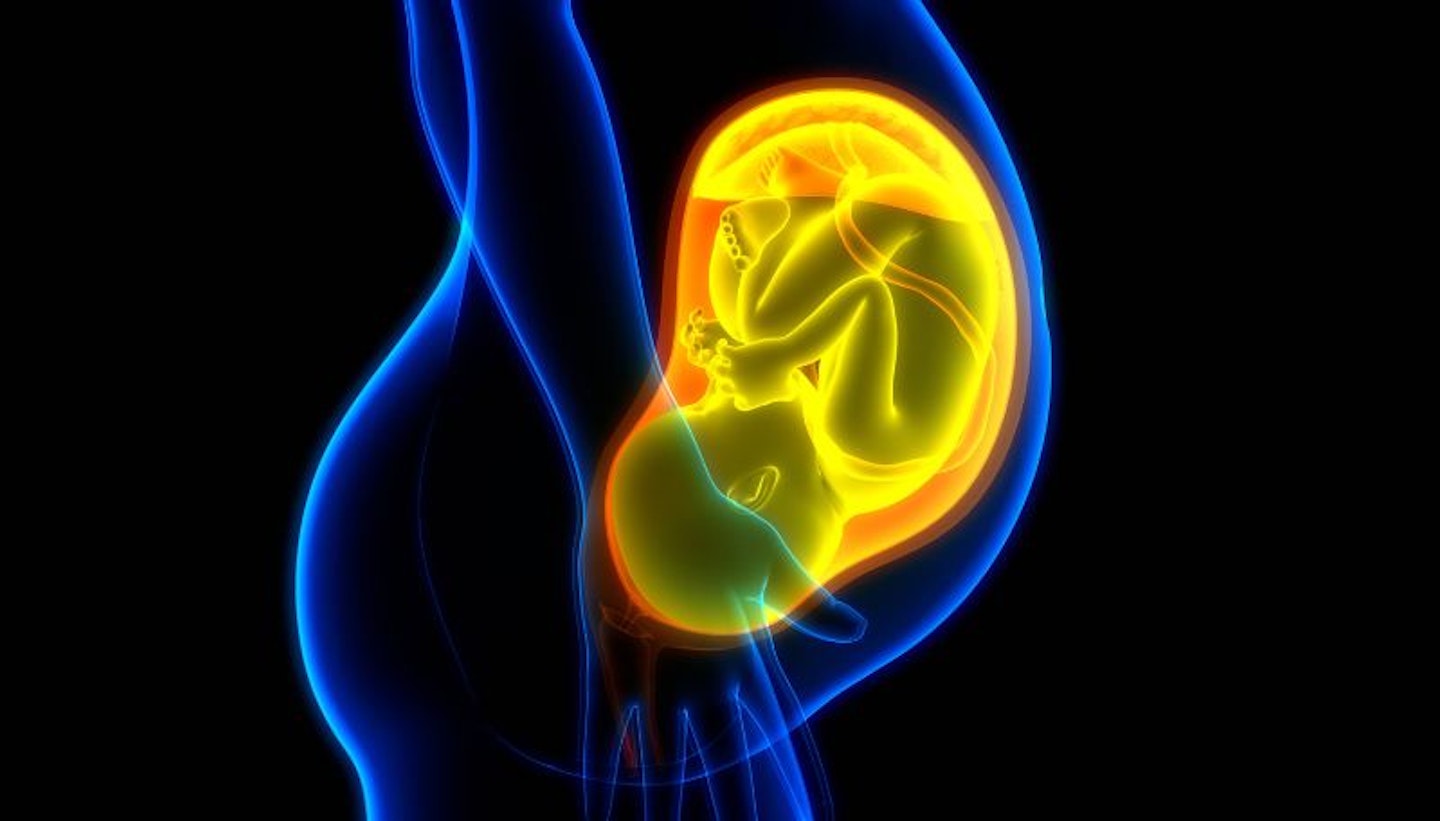You're 9 months pregnant and at the end of your third trimester - you're almost there! It may feel like you've been pregnant forever but it will soon be time to put on your Out Of Office and rest up until your new arrival comes along.
The final few weeks of your third trimester are full of physical challenges. You may experience pressure in your pelvis as the baby descends, leading to frequent bathroom trips and an awkward waddle. Yeah you know the one! Sleep may become a distant memory as your growing belly will make you feel uncomfortable and irritable and just when you nod off, your baby will start kicking when all you want to do is sleep. You may also find it uncomfortable to sit, stand or even walk for long periods. Some women also find that they suffer from heartburn and indigestion.
To help you keep a positive mindset through this final stage of your pregnancy, here's everything you need to know about the symptoms, baby development, your baby bump and more.
How many weeks is 9 months pregnant?
At the end of week 36 pregnant, you will be nine months pregnant. Between weeks 37-40, you're on the home stretch!
9 months pregnant symptoms
A lot will be similar to what you've experienced during your 8 month of pregnancy, but there might be a few new ones.
Swollen feet, ankles, legs
Yes, your feet and backache right now but you have rocked this pregnancy, even when it hasn’t felt that way and the finish line is in sight. Try resting where you can to help alleviate some of the pain, and try slow walks too.
Braxton Hicks contractions
These can actually occur from as early as 20 weeks pregnant, but you might noticeably be feeling them now. They can be sporadic and are also known as 'false labour' pains. Generally a midwife will tell you, if you can breathe during these sorts of contractions then you're not in labour!
Braxton Hicks is basically the feeling of pre-birth contractions that mean your baby is getting into place ready for birth. The contractions can come every 5-10 minutes and last up to a minute. The difference between active labour and these sorts of contractions is that the Braxton Hicks pains will not increase in intensity or length. It can be tricky to tell the difference, especially if this is your first baby, so to be on the safe side, it's a good idea to call your midwife.
Back pain
Lower back pain can really cause discomfort in the third trimester, with around 50-80 per cent of women reporting lower back pain during the whole of their pregnancy journey. With this added pressure on your joints and to help alleviate some of this back pain try placing ice or heat packs on the affected area or treating yourself to a pregnancy massage.
Stretch marks
You may have not had any by now and suddenly you've noticed narrow pink or purplish streaks or lines, some women have said that at 9 months pregnant their stretch marks have 'just appeared out of nowhere'.
Lots more toilet breaks
During this final month you're likely to experience pelvic pressure on your hips and bladder as your baby drops into place ready for birth. Although this will take the pressure off your lungs allowing you to breathe easier, you will feel a heightened urgency to go to the toilet.
Pregnancy energy
Not all mums experience this exhaustion, some feel on top of the world and are full of energy. This is also completely normal and everyones experience is different.
Facial hair growth
You may look in the mirror and see more hair than usual. Hair growth is due to hormones and typically goes away six months after birth. Your head hair may feel much thicker and fuller and taking vitamin supplements during pregnancy can also influence more hair growth.
The heartburn will worsen
By now you may have experienced your fair share of heartburn in pregnancy. The NHS recommends healthy eating to help with heartburn and indigestion, among other solutions. We highly recommend speaking to your GP before thinking about taking any medicines for indigestion and/or heartburn while pregnant.
Baby's movements
You should feel your baby move right up to and during labour. At this stage those gentle swirling or fluttering feelings have probably turned into big kicks and jerky movements. You should call your midwife or maternity unit immediately if you are concerned about your baby's movements.
Things to look out for if you are concerned about your baby's movement include, your baby is moving less than usual, you cannot feel your baby moving any more, baby is moving a lot more than normal, and you notice a change to your baby's usual pattern of movements.
Nesting mode engaged
You stand in the freshly painted nursery, day after day, in a silent, tidy house, looking at piles of unopened nappies, neat little stacks of newborn vests and a perfectly made-up cot, hardly able to believe that a baby really will be with you anytime now. The nesting process is natural and it's normal to feel an overwhelming desire to over-prepare your home for its new arrival and some mums find themselves making endless tweaks to the nursery throughout the final weeks before giving birth.
Baby development at 9 months pregnant

Size
Since 8 months pregnant, your baby will have gone through a little growth spurt - getting taller and heavier, hence the size of your bump. At 9 months pregnant, your baby will be about the size of a mini watermelon, weighing around 3.3kg (on average!)
Position
There’s a good chance that your baby is now facing head-down ready for their journey into the world. Your fetus may yet still have to to perform this somersault as some leave it until the last minute to change their position.
At 9 months pregnant, your baby will be about the size of a mini watermelon, weighing around 3.3kg (on average!)
Organs
By 39 weeks pregnant your baby's organs should all be developed. When your baby is born, your midwife will perform a general health check too.
Reflexes
Now that your baby's reflexes are coordinated and fully working, they can now close their eyes, and blink! But that's nothing, your baby can now turn their head and respond to sounds, light, and movements. Now you just have to wait!
Lanugo
With barely any time left in the womb, all of your baby's lanugo (thin layer of hair covering the foetus) will now be nearly gone. If a baby is born prematurely, they will still be covered in lanugo.
Your body at 9 months pregnant
During these last few weeks, your baby will go through a growth spurt and of course get heavier, which means that you will, too. You may gain approximately 1 to 2 pounds per week during the third trimester and once your baby engages or drops (into your pelvis), you'll definitely notice a change in your bump shape. Some expectant mothers will be excited, while some could be anxious. This part of the process is totally out of your control, so just enjoy the time and rest as much as you can.
Looking after yourself at 9 months pregnant
The final weeks before baby arrives are a precious time to prioritise both physical and mental preparation. Focus on activities that will truly benefit you now and in the postpartum period. Rest is paramount as is keeping gently active; exercise such as walking can help maintain physical comfort and energy levels. Indulge in relaxing activities like reading, taking a warm bath and spending quality time with your partner or any younger children.
What to do at 9 months pregnant
• Check your checklist
It's good to give your checklist one last look over as you enter month 9! You might need a few more bits before baby's arrival, so it's best just to make sure. You can even check with your midwife that you have everything you need to for your little one's arrival.
• Pack your hospital bag
Ensure it's ready to go in case you have a sudden and unexpected surprise. It's also a good idea to wash a few of your baby’s outfits so you have some packed and on hand and ready to use while others are ready waiting for them at home.
• Plan the hospital route
If you’re giving birth in the hospital, plan the route and drive it a few times to check how long it takes.
• Think frozen
Batch cook a few dishes and freeze them and stock up on non perishable items like pasta and sauces.
• Be prepared
If you are planning to breastfeed, ensure you have lots of maternity bras and breastfeeding-friendly tops. As well as this invest in a breastfeeding pillow, and a breast pump may also help. To be on the safe side, you could have baby bottles (handy for pumping later) and formula in case you have any difficulties breastfeeding.

Scans and appointments at 9 months pregnant
At nine months pregnant you’ll probably have antenatal appointments every 2-3 weeks. According to the NHS, your midwife will:
• measure to measure the size of your uterus
• check the position of your baby
• measure your blood pressure and test your urine for protein
• offer external cephalic version (ECV) if your baby is in the breech position
• ask about your baby's movements
Signs of labour
There are a few signs of labour to know about at this stage and which your midwife will have told you about already.
• Contractions
There's a difference between Braxton Hicks contractions, which are practice contractions, and the real thing. Labour contractions get stronger over time and will be painful. They don't stop and the sensation often starts in the back and is then felt at the front.
• Water breaking
When your water breaks, it's a sign you're in labour, but it doesn't mean your baby is going to make an immediate appearance - it still can take a few hours.
• Mucus plug discharge
During pregnancy, there's a plug of mucus in your cervix. This mucus comes away just before labour starts, or when in early labour, and it may pass out of your vagina. This is called the mucus plug discharge and when it is releases is called a show. It may come away in one blob or in several pieces.
FAQs 9 months pregnant
Are you technically pregnant for 9 or 10 months?
A full-term pregnancy is 40 weeks long, which actually equals 10 months.
Do and don'ts in 9th month of pregnancy?
Most things are safe to do and eat during month 9 but the NHS suggests avoiding a few things (the same throughout your pregnancy) like foods made from unpasteurised milk, raw or undercooked meat, liver and liver products, raw shellfish, alcohol, more than 200mg caffeine per day.
About the author
Maria Martin is Digital Group Editor for Yours.co.uk and Motherandbaby.com. She is a mum-of-two with a passion for helping women from all walks of life – from supporting breastfeeding mothers with expert advice to encouraging conversations about mental health. In her professional role, she has over 10 years' experience in the digital world, including editing articles, focussing on SEO, social media engagement, picture researching and video editing.
